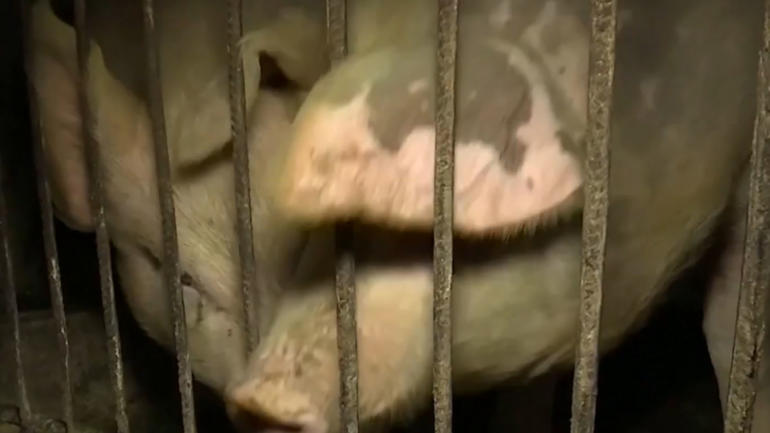African Swine Fever has hit more than 50 countries. China is one of the hardest hit, with another outbreak confirmed this week in Yunnan Province.
Worried U.S. pork producers are working hard to keep the disease from spreading to their shores.
CGTN’s Hendrik Sybrandy shows us what they’re doing.
“Right now we are in my show barn where we keep our show pigs,” Will Gray said.
The Longmont, Colorado farmer raises pigs, like Elliott, for competition. “They’re really pampered,” he said. “These pigs sometimes live a little better than we do.”
Will gets attached to his animals during their very short lives. “If you aren’t crying on sale day, you weren’t at the barn enough.”
Show pigs are particularly susceptible to disease, according to Will, which is why he keeps his barn as clean as possible.“Pigs are very robust animals but at the same time they’re very fragile.”
That fragility has been driven home by the toll taken by African swine fever, a highly contagious and deadly viral disease that has devastated pig herds across Asia and beyond, hitting China especially hard.
“There’s no treatment and there’s no vaccine,” Colorado State Veterinarian Keith Roehr said. “It has a very high mortality rate.”
Roehr said the virus can live for years, “so once it’s established in an area, it’s very, very difficult to eradicate.”
That lends urgency to efforts to keep African swine fever from entering the U.S. and, if it does, to containing any outbreak.
“We’re of the mindset that we always need to be prepared,” said Joyce Kelly, the Executive Director to the Colorado Pork Producers Council.
She said the so-called Secure Pork Supply guidelines are aimed at ensuring production doesn’t come to a standstill if a case turns up here.
“Should something happen, how can we keep hogs moving, people confident in our products and the rest of the industry safe,” she explains.
Earlier this fall, 14 U.S. states held a drill simulating the search for the index or very first case of African swine fever. Other exercises have also been conducted, and animals other than pigs are also playing a role in preventing a possible outbreak.
The U.S. Department of Agriculture’s Beagle Brigade is trained to sniff out prohibited pork products that travelers might bring in from affected countries.
Tainted animal feed is another potential virus carrier which has experts looking at ways to better test or isolate that feed. Roehr said it’s hard to know if existing biosecurity measures have kept African swine fever out of the country.
“You don’t grow weary at doing well, you continue to do the right thing,” he said. “We hope what we’re doing is adequate.”
African swine fever cannot be transmitted from pigs to humans and is not a threat to food safety, but it is on the minds of many.
“I’m scared for the industry but I’m also scared for my pigs,” Gray, as he wonders what kind of dangers lie just over the horizon said.
 CGTN America
CGTN America

